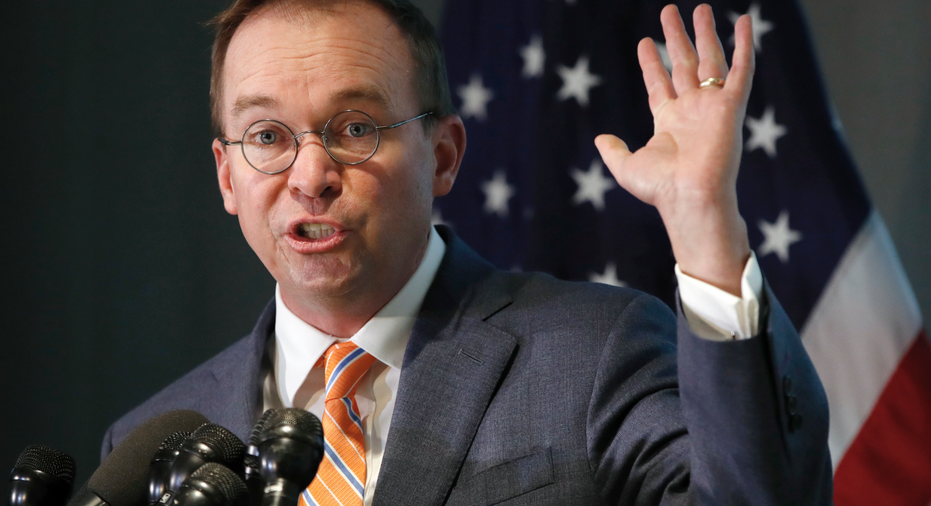2 battle for control over US consumer watchdog

WASHINGTON – The battle between two supposed directors of the Consumer Financial Protection Bureau is making for compelling optics but only seems to be delaying a tidal shift at the powerful consumer watchdog.
Mick Mulvaney, President Trump's budget director and now his choice as acting director of CFPB, made a conspicuous effort Monday to show he was firmly in control of the bureau. Meeting with reporters, he promised a new approach at the agency, which he called example of "bureaucracy gone wrong." Earlier, he arrived at work with doughnuts for the staff.
Leandra English, who was elevated to deputy director of the bureau late last week by Cordray upon his resignation, sent staff an email offering Thanksgiving wishes — hours after asking a judge to block Mulvaney from taking over. Mulvaney sent his own email telling staffers to "disregard" any directions from English.
Even if English wins in court, the clock is ticking on the bureau's current direction. Mulvaney, and likely any Trump appointee, is certain to roll back the bureau's aggressive stance and be more accommodating to banks and other financial companies. In his first move in the interim role, Mulvaney ordered a 30-day freeze on any potential new regulations or hiring. He was also unrepentant in his criticism of the bureau, which dates back to his time in Congress.
In requesting a temporary restraining order against Mulvaney, English cited the Dodd-Frank Act, which created the CFPB. She said that as deputy director, she became the acting director under the law and argued that the federal law the White House contends supports Trump's appointment of Mulvaney doesn't apply when another statute designates a successor.
The case, at the U.S. District Court of Washington, D.C., is being handled by Judge Timothy Kelly, a Trump appointee recently approved by the Senate. Judge Kelly did not make any ruling on the case at an initial hearing Monday, saying he wanted to wait to hear the government's argument before issuing any ruling.
The Trump administration defended its position in a court brief filed late Monday.
It said that both the Justice Department's Office of Legal Counsel and the general counsel of the CFPB "agree that the President of the United States lawfully designated John M. Mulvaney as the CFPB's Acting Director pursuant to the VRA (Vacancies Reform Act).
"Plaintiff's arguments to the contrary rest on a bureaucratic sleight-of-hand effected on the final day of former CFPB Director Richard Cordray's tenure," it said, alluding to English's elevation by Cordray to the agency's top job on an acting basis.
Cordray was appointed CFPB director by President Barack Obama and has been long criticized by congressional Republicans for being overzealous, but lauded by consumer advocates for aggressively going after banks for wrongdoing. For instance he fined Wells Fargo $100 million for its aggressive sales practices. He was one of the last Obama-era political holdouts.
Cordray said Monday that the issue should be settled by a court.
"The law says that I shall appoint the deputy director, and I did so," he said.
Former Rep. Barney Frank, a Massachusetts Democrat, told MSNBC late Monday the drafters of Dodd-Frank worked intentionally to isolate the consumer agency from the pressures of politics and said that's why it created a system for succession as part of the law.
Most of the regulations under Cordray are already finalized, including one pending in front of Congress regarding payday lending. But there are other potential regulations, including how banks do small business lending and disclose data on home mortgages. These rules are still in the works.
Mulvaney spoke to reporters at the CFPB the end of the day, which included meetings with staffers and reviewing issues currently facing the bureau.
"This agency will stay open," he said. "Rumors that I'm going to set the place on fire, or blow it up or lock the doors are completely false. I am a member of the executive branch of government; we intend to execute the laws of the United States, including the provisions of Dodd Frank. "
However, bank lobbyists are expecting a softer hand from Mulvaney and any Trump appointee. The CFPB has long been criticized by Republicans and the banking industry as an agency with too much power and too little accountability.
"We need someone who can be for consumer protections but also understand how a bank operates," said Richard Hunt, CEO of the Consumer Bankers Association, a lobby and trade group for the nation's biggest retail banks.
The administration's case in the acting director controversy rests on the Federal Vacancies Reform Act, which gives the president authority to appoint temporary department heads while their permanent nominees are approved by the Senate.
While the Vacancies Act does allow a president to appoint acting directors at agencies like the CFPB, the Dodd-Frank Act has specific language that seems to indicate that only a deputy director can step into the acting director position.
The Office of Legal Counsel, which acts as a legal adviser to the president, argued that Mulvaney was the legitimate director and, in a blow to English, so did Mary McLeod, the general counsel of the CFPB.
One straightforward solution to the issue of who runs the CFPB is for Trump to nominate his own permanent director. But it may take several weeks for someone to be nominated and even months until the Senate could confirm his or her appointment.
Until the issue of who is in charge is cleared up, any actions taken by the CFPB are likely to come under legal scrutiny from the banks, credit card and other financial companies that the agency oversees. No fines are likely to be imposed or new regulations written.
___
Sweet reported from New York. AP reporter Julie Carr Smyth contributed from Columbus, Ohio. AP reporters Jeff Horwitz and Jessica Gresko contributed to this report from Washington.



















